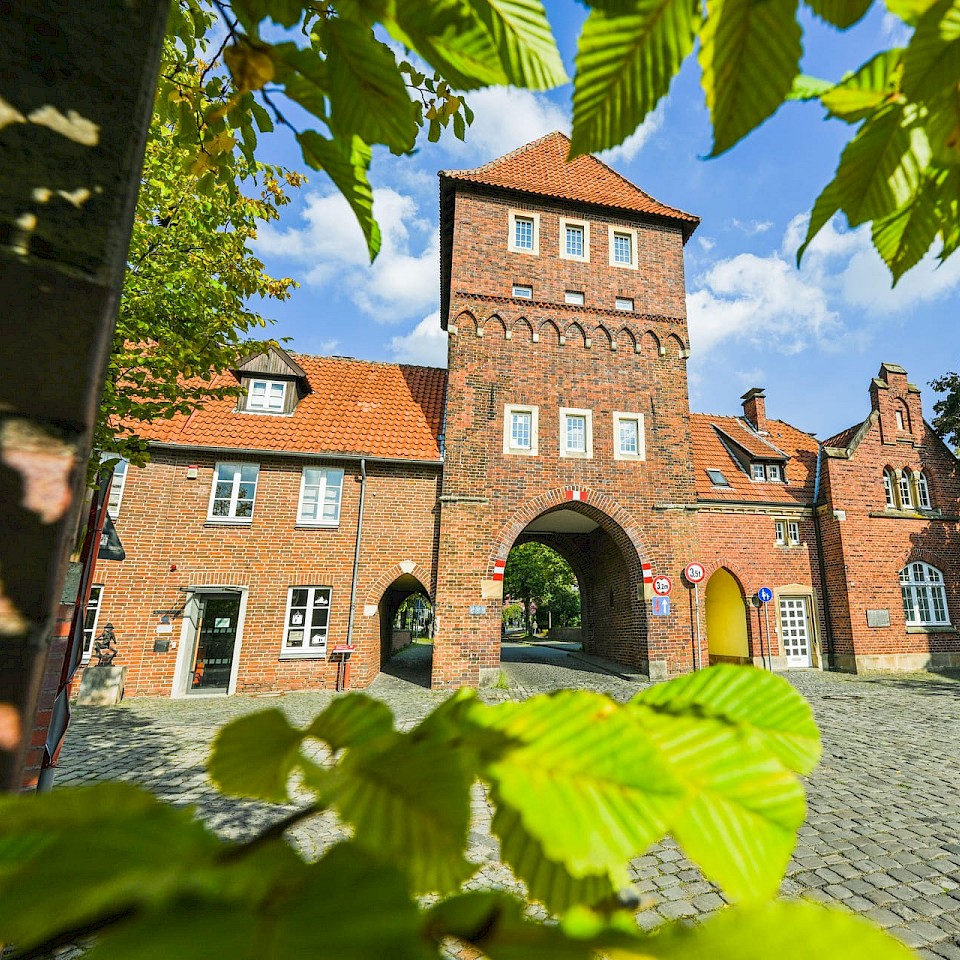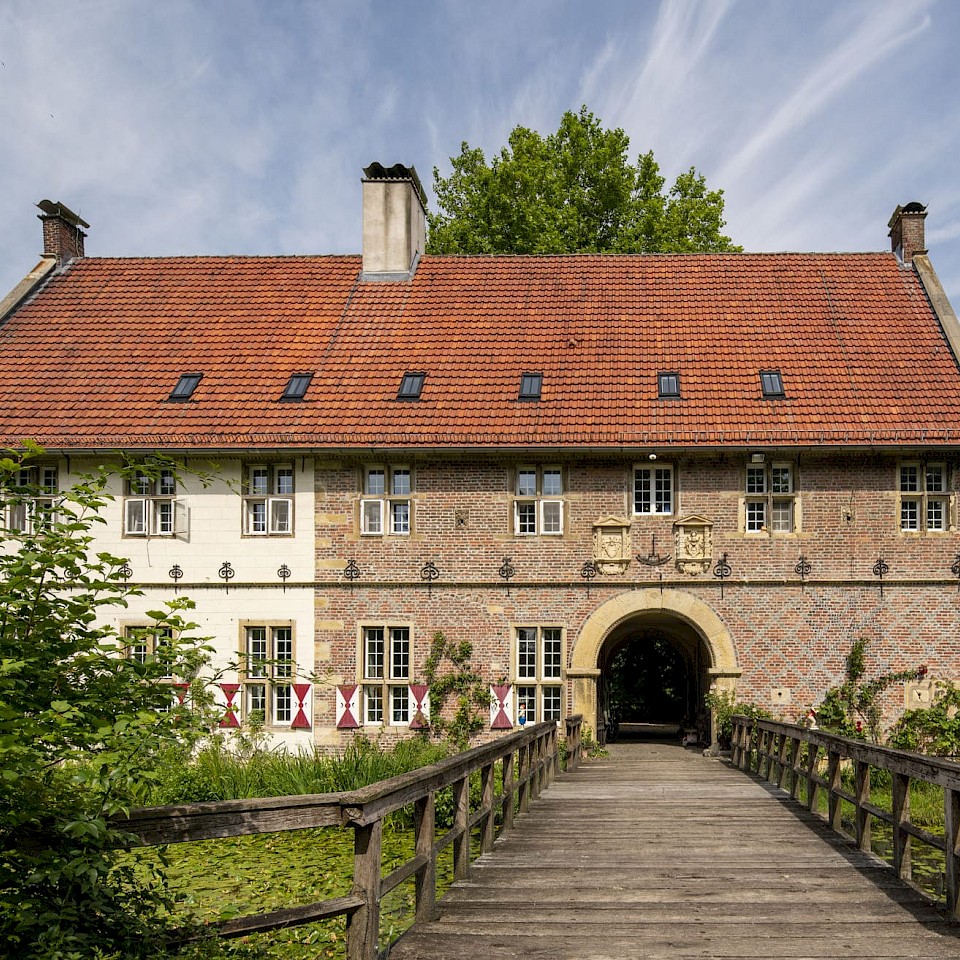
© Münsterland e.V./Philipp Fölting
"The beauty of the castle is not subject to any zeitgeist".
Stories from four and a half centuries surround the House of Loburg in Coesfeld - and the aristocratic residence probably already existed when Charlemagne ruled. Today, Loburg is home to the family of Princess Sophia zu Salm-Salm, who knows all about how the place has changed. In autumn 2022, she fulfilled a long-cherished dream by opening her own farm shop: Just opposite the house, she offers regional vegetables and items from selected manufacturers, among other things. In this interview, Princess Sophia zu Salm-Salm talks about eventful times, a never-ending building site and dealing with tradition.
The courage to rebuild
Princess zu Salm-Salm, the history of Haus Loburg goes back to the 16th century. How did it come into your family in 1912?
Our ancestral seat is the moated castle of Anholt in Isselburg. The first-born remained there at the time and Loburg was bought for Franz, the second son, as compensation for an heir who gave way. He was my husband's grandfather. We Salms have lived here for 120 years, but some farmers have lived here for much longer. We recently moved here for the Coesfeld Paohlbürger.
Franz Prinz zu Salm-Salm and his wife Maria-Anna had to experience how Haus Loburg was almost completely destroyed in a bombing raid during the Second World War. What do you know about it?
The hospital had previously been relocated to Loburg because the location in the city was considered to be at risk. Nobody can say why the British bombed the Loburg several times in March 1945. In the end, the main building was completely burnt down, but at least the outer walls of the gatehouse were still standing. The chapel was the only part of the building that still had a roof and therefore means a lot to us.
Your husband's grandparents decided to rebuild Loburg House.
They wanted to rebuild their home. They started with the gatehouse, exactly as it had once stood there. The main house was to follow later, but this never materialised. On the terrace, they chiselled in a stone: "Destroyed and rebuilt in 1948". I am very moved by the fact that they found the courage to do this despite their particular personal situation. They were left with nothing and were both over 60, which was quite an advanced age at the time. Their daughter lived far away in Berlin, one son had been killed in the war and another son - my father-in-law - was a prisoner of war. When reconstruction began, they had not yet received any sign of life from him.
Is the courage of your ancestors what impresses you most about history?
On the one hand, yes. For another, the house was always a kind of refuge and a centre of intense helpfulness among the neighbours. This support runs through the ages. If I had a problem of any kind, someone would be there at the drop of a hat.
A never-ending construction site
You got to know Haus Loburg more than 20 years ago. How do you remember it?
I immediately felt at home here and knew that this was a particularly beautiful place. I spent the first few months in the attic, sorting through the countless things there. The family, marked by the poverty of the war, had kept everything: from pots with a handle to household appliances that had never been used because the old ones still worked. These finds showed me how modestly people lived here. In the beginning, I sometimes wished I could just put away a shelf in a small flat. I had to get used to the house.
What do you mean?
The Loburg is a wonderful house, but also a permanent building site. You spend a lifetime working on it. When my husband came here in 1992, he first had the windows replaced. Together, we then took care of the urgent renovation of the façade. There are ideas from back then that have not yet been realised because other things have always taken priority. A broken pipe simply can't wait. People who live here think alternatively. Everything is a little different in Loburg.
What example comes to mind?
There isn't a single straight wall in the house. And there are three different types of flooring in our kitchen: floorboards, black and white tiles, Solnhofen tiles. For some people, this confusion would be almost unbearable. An old operating table that was retrieved from the ruins of the house in 1945 is now our dining table - with a new wooden top on the historic iron frame.
What delights you about your home
There's a huge old plane tree in the Loburg courtyard. When I'm raking leaves, I think: Wow, if this tree could tell stories! It would be incredible to hear what has already happened here. With this house, we are living a generational contract: after our steps, our children take the next. Each generation has its share in the development of the house. It's a lot of work, yes. But the joy outweighs it all.
From the stable to the farm shop
Agriculture and forestry are part of Haus Loburg. How has it developed over time?
Loburg was an independent farm for a long time, even with cows and pigs. Later, most of the land was leased out. Ten years ago, the conditions changed - so we farmed the land ourselves again, this time organically. We expanded into forestry in Saxony-Anhalt. The business there is our second mainstay and helps to finance the upkeep of the house. If you live at Loburg, you always have to think and act a little differently.
In autumn 2022, you opened a farm shop not far from the house. How did the idea come about?
When we switched to growing organic vegetables, I said: When the farm is up and running one day, the next step will be the farm shop. This building used to be a barn, with hay above us. We had initially converted it into a washing shed. The produce from our fields ended up in the vegetable washing machine here, and a small office was set up over there. During the coronavirus pandemic, the plans for the farm shop finally became more concrete.
You sell a wide variety of products. What do you look for when choosing?
A product has to be of good quality - whether it's a tomato or a wooden object. Our motto is: you only spend money once. I know the producers and can tell my customers something about the origin of each product. The basis is formed by the vegetables that grow around here, our game from Saxony-Anhalt and the wine from our nephew's estate on the Nahe in Rhineland-Palatinate.
What interests people about what they buy?
I know that some people think: organic farming is good, conventional farming is bad. But you can't generalise like that. In fact, there are different types and we take a close look when putting together our range. Why should I buy an organic carrot from Baden-Württemberg when it grows in the field right under my nose? Another example is garlic, which is grown conventionally two kilometres away from here. At first, people came into the shop and asked: "Is it all organic?" No, I said, and explained the regional references. They realised that I associate something with every product and that it doesn't need a certificate. I'm also interested in the added value of products: What goes on the table, how do I eat and how do I enjoy it?
Are you satisfied with the response to your farm shop?
The shop has become a meeting place, many people from the neighbourhood shop here. I'm very happy about that. People in the neighbourhood say: "Now we buy the apples here, from Sophia, of course."
With the farm shop, you have added something to the traditions around Haus Loburg.
Tradition should not mean standing still. It must be developed further. Only with this attitude can a farm survive in the long term. Something is always happening in Loburg - whether a tree falls, the sheep escape or the hens lay their eggs somewhere else. Since the opening, I've been keeping interested parties up to date on Instagram about what's going on in the shop and on the farm. When I open my eyes in the morning, there's bound to be some kind of news. That's quite normal, but above all it's very nice.
The interview was conducted by Christoph Schwartländer.
Sophia Princess zu Salm-Salm, born in 1973, grew up near Düsseldorf and studied agricultural science. She has been married to Franz Prinz zu Salm-Salm since 2001. The couple have three grown-up sons. The family lives in Haus Loburg privately. The chapel of the manor house is a popular venue for civil weddings in the town of Coesfeld. The "Loburger Vielerlei" market is held at Haus Loburg on the third Sunday of Advent every year. All information about Sophia Princess zu Salm-Salm's farm shop can be found at www.hofladen-loburg.de and Instragram under "hofladenloburg".














